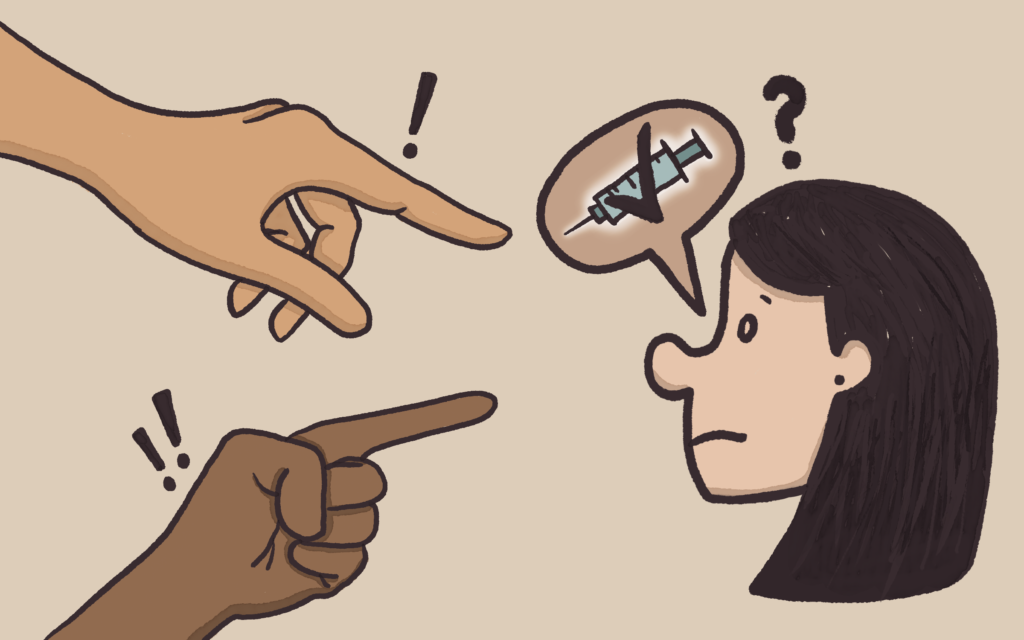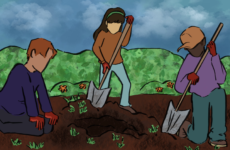
Graphic by Yujin Kim/The Choate News
Over the past year, we have all experienced the unavoidable conversations about how seriously to take the pandemic — the ones where we decide whether or not we ought to skip the big spring break party in order to avoid spreading Covid-19 to our family. Unsurprisingly, the interpretations of public health guidelines have often become largely influenced by our personal proclivities. For my friends who value their social life more than their own health, their pandemic ended once summer began. Others still remain cautious today, rather than spending their weekends as if it were 2019.
At a certain point, we all began making our own decisions regarding how closely to follow Covid-19 precautions. We’ve created our own cultures of what social behaviors we deem acceptable — cultures determined by geography, politics, and socioeconomic status, among other factors. Because of this, the debate of personal preference versus public safety has found substantial footing in the pandemic. At the beginning of quarantine, some people stayed inside to mitigate the spread, while others ventured out in makeshift masks composed of a bandana and two hair elastics. Over the summer, the same conflicting viewpoints arose when it came to indoor versus outdoor dining.
At the center of shifting public precautions resides the big question: Who will be the arbitrator of these new social mandates? Despite national guidelines, it has become abundantly clear that there is no overarching authority that can enforce whether businesses and individuals will choose to follow them. The arbitrator is ultimately ourselves, so we must do our best to put aside our personal preferences for the greater goal of public safety.
Now that many Americans are beginning to receive the Covid-19 vaccine, the idea of re-entering a world of pseudo-normalcy isn’t too far-fetched. My parents, who both work in medical settings, were among the first in the United States to receive the vaccine. With this newfound privilege, their gatherings have grown in size, and their outings have become varied in terms of distance and activity.
My brother and I, who remain unvaccinated and vulnerable to the disease, brought this conversation to the dinner table one night over spring break. While my parents weren’t susceptible to the virus and had a decreased ability to transmit it, my brother and I felt it inappropriate for them to flaunt their lightly-masked privilege in settings where others couldn’t do the same. It’s not as if other people dining at the same restaurant could tell if my parents were vaccinated or not. While they presented no substantial threats to public safety, wearing a mask and distancing is still a matter of respect — respect for the establishments they inhabit and their occupants.
As our perceptions of what is acceptable begin to shift, communication will become imperative to creating a society in which people can be safe. A solution to the possibility of miscommunication is a vaccine passport, nicknamed the ‘vax pass,’ which will allow only vaccinated people to do certain things and enter certain areas. These places could include cruises, international travel, sporting events, and theme parks. Not only will this encourage those who are unsure about receiving the vaccine to schedule an appointment, but it will also allow for ensured public safety and comfort.
The decisions we make as the vaccine rollout progresses ultimately comes down to our prerogatives. Not only is safety a priority, but remaining considerate of those around us is, too. While it is not our moral obligation to keep others in check and ensure that they follow the rules, we can choose to follow national safety guidelines ourselves. In the end, the scales will balance out: if we continue to be cautious and responsible, our actions as safe, precautionary citizens will balance out those of the negligent bystanders.
As the vaccine becomes more widely available and the world re-enters some kind of normalcy, maskless gatherings, various travel methods, and in-person education will resume, although other things will look different than before. Though it is helpful to consider all of the possibilities, we will never know how the Covid-19 vaccine will affect our global community until we see it in action. We can, however, remain vigilant in how we go about our daily lives.




